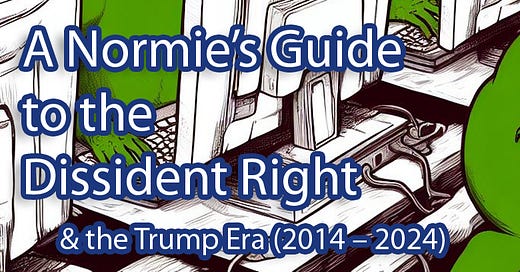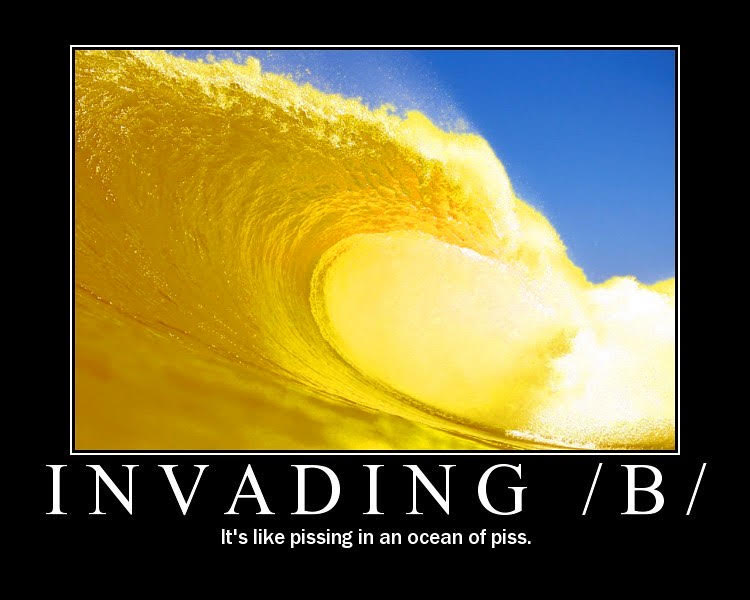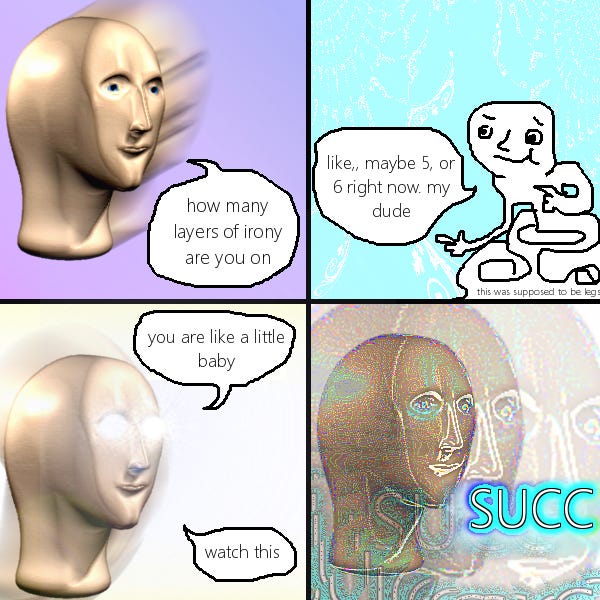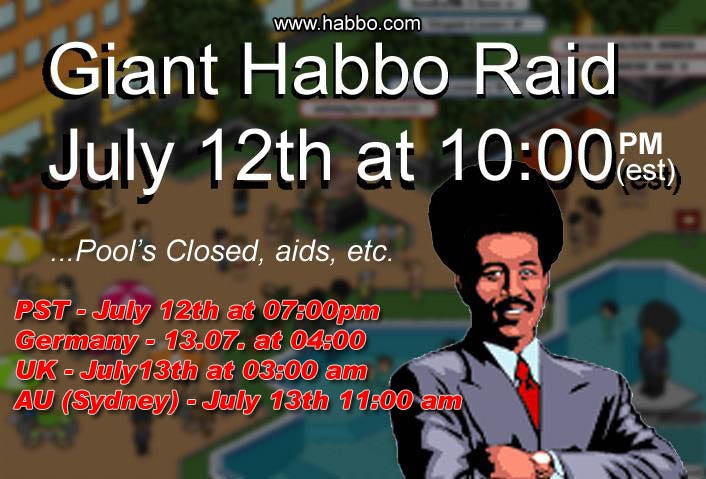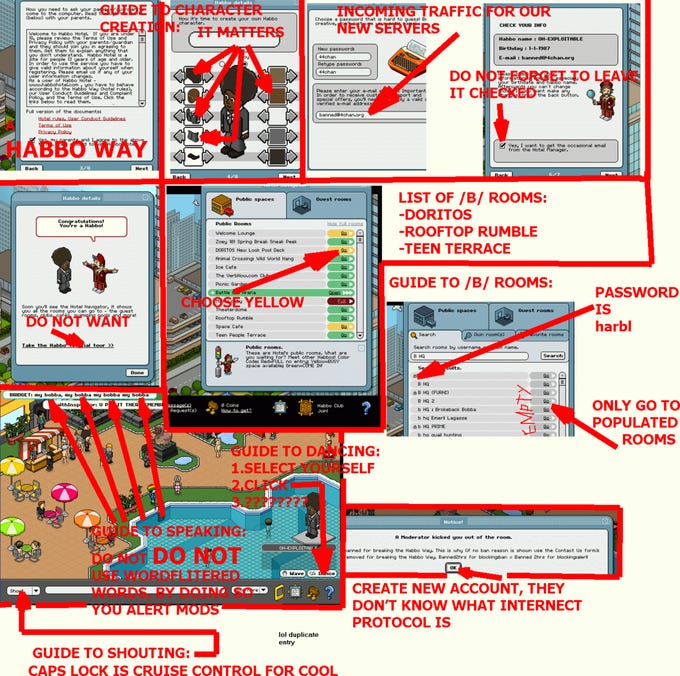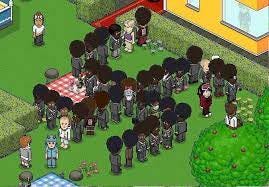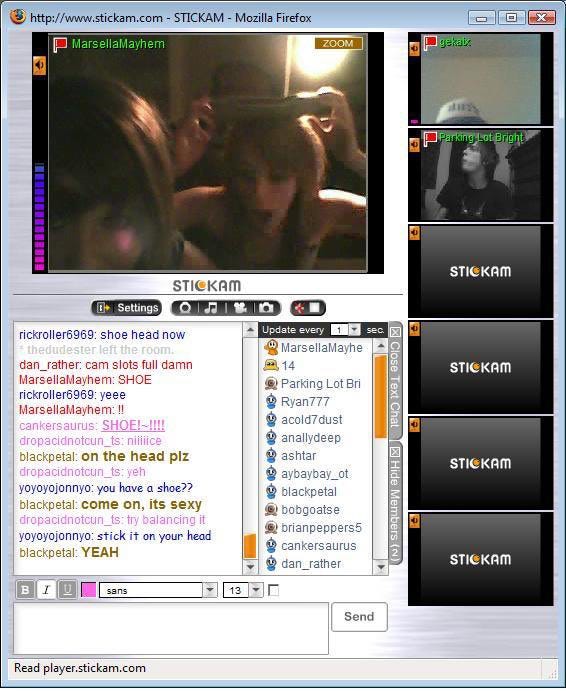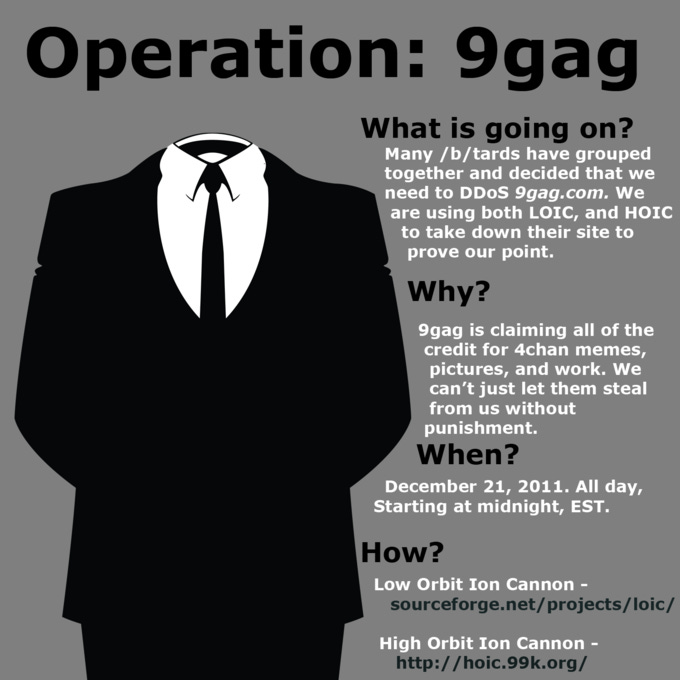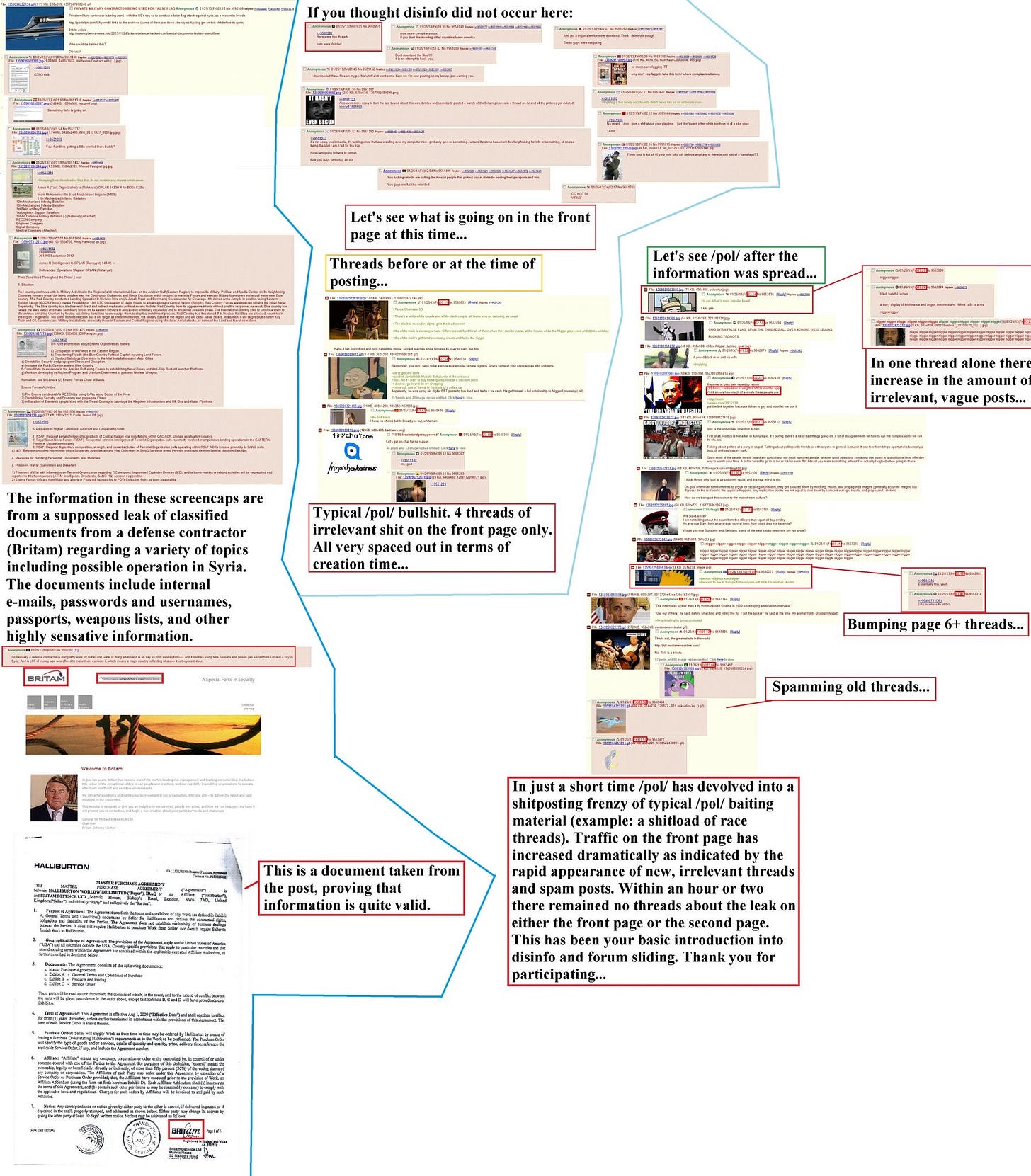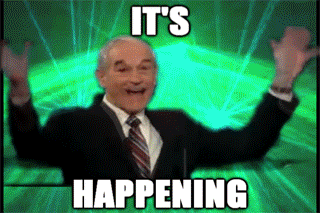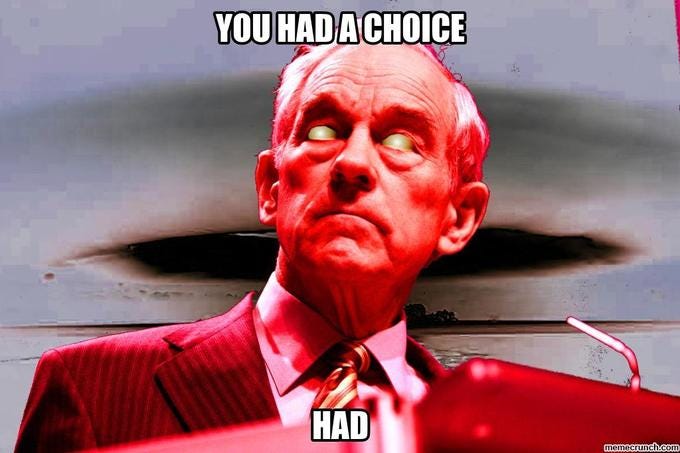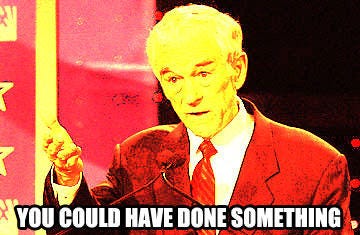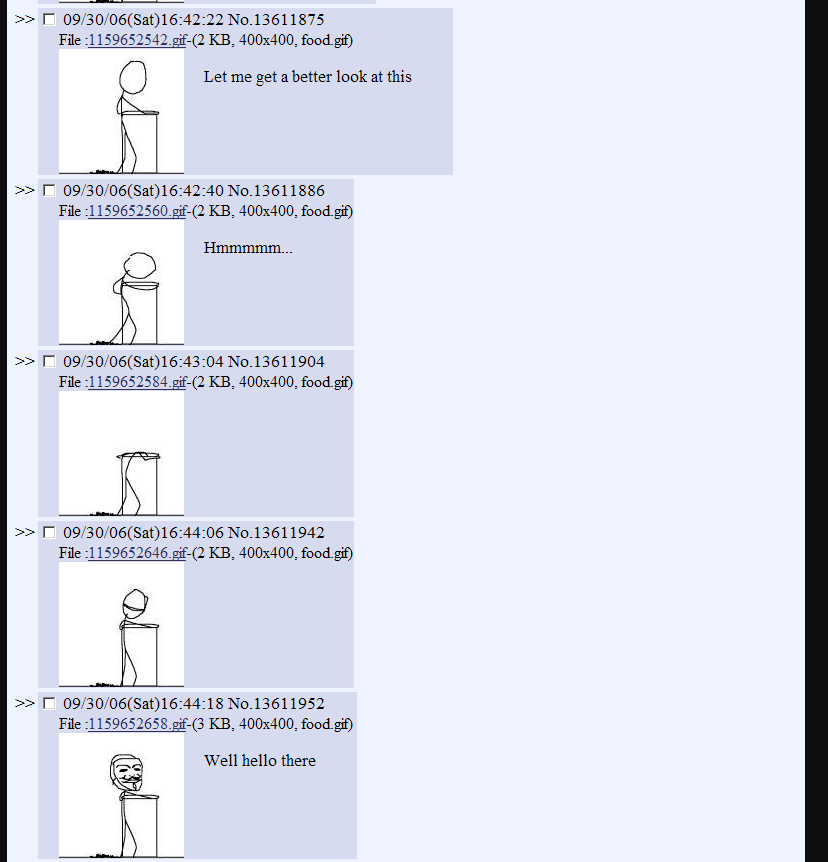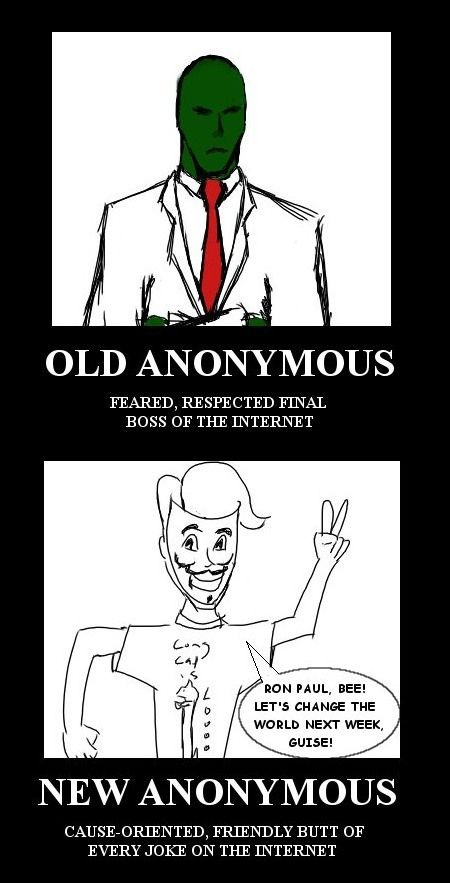A Normie's Guide to the Dissident Right - Part 1 - Before 2014: The Wild West, 4chan, /b/, /new/, Anonymous, Occupy Wall Street
A Normie’s Guide to the Dissident Right
& the Culture War Era
The Wild West (1991 - 2016)
The years between 1991, when the Internet was first opened to the public, and 2017, when Internet censorship began following Trump's victory in the 2016 election, roughly correspond to a time known online as the "Wild West" Era of the Internet.
It is interesting to note the dates here. 1991 was also the fall of the Soviet Union. Just as the Iron Curtain fell, and the entire world became united into one global system, so too did the Internet connect the entire world into one worldwide information network ("the worldwide web"). And this new world would be united under one ideology, the post-war liberal thesis. A phenomenon that Francis Fukiyama dubbed "the end of history."
In 2017, the same year that Trump rose to power, as a personification of the antithesis of the liberal thesis, history began again. And this was instigated in part by the new worldwide web that had begun the year that history had ended. And so 2017 would also see an attempt to shut down the means by which history had been resurrected, from that seed planted at the very moment of its intended death. But, we are getting ahead of ourselves. Let us start by going back in time to the 1990s and 2000s.
The Internet as it existed before 2017 was in many ways an entirely different Internet than what we have today. The Internet existed alongside older forms of mass media such as television, radio and print. It was often accessed on a large and cumbersome PC, often in a family computer room. Although ubiquitous in business, entertainment and other industries, it was, for the average consumer, still an "opt-in" experience. Some people went online, while others chose not to. For the first decade or so of the Internet, the culture of the Internet was the product of a specific demographic: predominantly young, predominantly hobbyists who were interested in technology or other related industries, predominantly white, overwhelmingly male (a common meme at the time was "there are no girls on the Internet"), usually geeky and above average in IQ, and generally either from the English speaking world, parts of Europe, or Japan.
There was a clear demarcation between "the online world" and the "IRL" (in real life) world. The Internet was something that you "logged on" to. It was not omnipresent. Your various gadgets were not "smart gadgets," and they did not connect to your WiFi.
There was also a culture of anonymity to varying degrees. Most users did not post under their real names or with their real identities. In fact, one of the first things that parents would tell their children before allowing them unsupervised Internet access was to NEVER give out their real name, address, or any personal information whatsoever. Instead of their real names, users used a username (also called a screenname or “handle”). Instead of their own face, they used an "avatar." Anime and videogame characters, as well as memes, were popular avatars.
Most Millennial and older Gen Z readers will probably be familiar with at least these basic aspects of early Internet culture, but it is still important to note, if for no other reason than to contrast it with the very different Internet that exists today.
In the beginning, the Internet was wholly decentralized. The first large "platforms" were search engines, such as Yahoo and Google, that connected a multitude of totally autonomous blogs, homepages, and forums. These forums, such as Usenet, Something Awful, and various phpBB boards, were the first communities online in which Internet culture proliferated. By the 2000s, social networks like Facebook and MySpace came into existence, along with the first "platforms" such as DeviantArt, LiveJournal, YouTube, and Newgrounds, where users could share original content. By the 2010s, the Internet had become more centralized, with social networks such as Twitter and YouTube gaining importance. However, these existed alongside older-style, independent forums like 4chan and Reddit.
There was above all else an ethos of complete, free and unrestricted access to information for all. A democratization of the means of information. Information anarchy. This attitude was shared by basically all Internet users no matter what community they belonged to, or what other beliefs they might have held. Copyright law was seen as something like a relic of an older, less advanced age, and piracy was rampant. Freedom of speech was unquestioned. Forums were self-moderated by their users according to the rules of that particular community. Even large platforms such as Facebook were lightly moderated and adhered to the principle of "free speech absolutism." Twitter originally claimed to be "the free speech wing of the free speech party" (https://www.theguardian.com/media/2012/mar/22/twitter-tony-wang-free-speech). Until 2014, 4chan's /b/ board allowed basically all speech that it was not forced to take down due to law, such as child pornography.
With the exception of the attitude towards copyright law, this libertine attitude towards speech was for the most part shared by the government and corporate establishment. It was unthinkable that someone would be banned simply on the basis of their political beliefs. It was not until 2017, when Andrew Anglin and Alex Jones were banned, that this attitude was challenged. When moot banned GamerGate from 4chan in 2014, this was seen as a betrayal of the entire community, and caused alternate platforms such as 8chan to be created in protest. Until 2017, the Internet believed in a principle known as the "Streisand Effect."
The "Streisand Effect" was the idea that any attempt to censor information on the Internet would instead backfire and cause this information to proliferate even more. It was named after a case in 2003 in which Barbara Streisand sued to remove a picture of her mansion from a publicly available aerial photograph created as part of the California Coastal Records Project, a collection of 12,000 California coastline photographs documenting coastal erosion. The highly publicized lawsuit instead caused thousands more users to download the photo and share it online.(https://en.wikipedia.org/wiki/Streisand_effect). It was thought at the time that this was some sort of unquestionable law of the Internet, and that it was therefore impossible to censor information online. Later, during the Censorship Era of 2017-2021, this would be challenged, and censorship would prove to be more successful than previously assumed. But, in the early days of the Internet, it did bear itself out from time to time and seemed like a plausible theory (GamerGate got banned by moot? Well, we’ll just carry it over to 8chan and it will proliferate even more!)
All of these various trends combined to create "Internet culture," an underground subculture that existed throughout the online world. While various sites and their communities were important sources of this Internet culture, including Something Awful, YouTube, DeviantArt, Twitter, Tumblr, Reddit, MySpace, Facebook and elsewhere, none were as impactful as 4chan.
4chan: "The Final Boss of the Interwebs"
4chan was started in 2003 by a 15 year old named Chistopher Poole, better known by his Internet alias, "moot."
Poole had been a regular participant on Something Awful's subforum "Anime Death Tentacle Rape Whorehouse" (ADTRW), where many users were familiar with the Japanese imageboard format and Futaba Channel ("2chan.net"). When creating 4chan, Poole obtained Futaba Channel's open source code and translated the Japanese text into English using AltaVista's Babel Fish online translator. After the site's creation, Poole invited users from the ADTRW subforum, many of whom were dissatisfied with the site's moderation, to visit 4chan, which he advertised as an English-language counterpart to Futaba Channel and a place for Western fans to discuss anime and manga.
-- Wikipedia (https://en.wikipedia.org/wiki/Christopher_Poole)
4chan was originally a product of "otaku" culture -- a subculture of Japanese pop culture enthusiasts, especially of anime, manga, and Japanese videogames. The first boards on 4chan were /a/ - anime /b/ - anime/random (later shortened to just random), /h/ - hentai, /c/ - cute, /d/ - hentai/alternative (the d was related to the word "deviant") and /y/ - yaoi. (Author’s note: Hentai is a term for pornographic Japanese comics and yaoi is a term for homosexual pornographic Japanese comics. In other words, all of the original boards discussed anime, manga, and Japanese culture)
4chan contained a small number of fixed boards. Unlike other forums which would archive their threads for months or years, threads on 4chan would eventually be deleted and replaced by newer threads when people stopped posting in them or the post limit was reached for that thread, usually after a few hours or days. This gave content on 4chan an ephemeral nature. Each board was dedicated to a separate topic, and designated with one or more letters. /a/ was the board for anime, /co/ for western comics, /v/ for videogames, etc. But the most infamous and popular board was /b/ - Random.
The stories and information posted here are artistic works of fiction and falsehood.
Only a fool would take anything posted here as fact.
-- The official description of the board on the top of 4chan's /b/
It was on /b/ that much of 4chan's unique culture originated. The posts here ranged from "drawfag threads" (artists would draw things and take requests from the users), "greentext stories" (anonymous personal anecdotes), "copypasta" (stories or short posts that were frequently reposted again and again), memes (images or phrases that served as essentially "inside jokes" in the form of templates that users could riff of, such as "advice animals" and "rage comics"), "troll posts" (users would try to invoke a response from other users with intentionally provocative posts), "raids" (users would go to other parts of the Internet to troll them), "ops" (users would work together to accomplish a task, such as a raid), or simply other random discussions.
On 4chan, anonymity was taken to its furthest extreme. Unlike most forums, users on 4chan could post entirely anonymously, without having to create an account of any kind. The user could choose to enter a username for individual posts, but this would not be stored in any way. If a user did not enter a username, which was usually the case, their name would appear as "Anonymous." As a result, 4channers began to refer to one another as "anon" and to themselves collectively as “Anonymous.” It's interesting to note that this was entirely a random coincidence of history. The technology was not deliberately created by moot with any particular objective in mind other than discussing otaku culture, and these Japanese imageboards just happened to include this anonymity feature.
As discussed in the introduction, "the medium is the message." The fact that 4chan was anonymous and ephemeral had a profound effect on its culture. It further amplified the already anarchic and free speech nature of the Internet. It would not be an exaggeration to say that it created a decade in which an entirely unprecedented historical anomaly occurred, allowing for a level of free speech that has probably never existed before or since in the entirety of human history. Thousands of users could express whatever view they wished, entirely anonymously, and receive entirely anonymous feedback. Unlike typical forums such as Reddit, in which users had an online identity that was consistent from post to post, there was no online persona for anon, unless they wished to create one by "namefagging" (entering a name into the Name field of the post and continuing to use this name for subsequent posts). Unlike typical social media platforms such as Facebook, posts did not receive "upvotes" or "likes" based on their popularity. Unlike today, no "algorithm" chose which posts would be shown, hidden, boosted, or shadowbanned. Instead, every post was treated as equal, displayed in sequential order, and judged solely on its own content.
The sense of humor of 4chan reflected both that of the Internet as a whole, and of the times. Surreal and absurdist humor such as the Adult Swim show Aqua Teen Hunger Force was very popular, and "lolsorandum" humor such as Invader Zim was also contemporaneous with the golden age of 4chan.
hi every1 im new!!!!!!! *holds up spork* my name is katy but u can call me t3h PeNgU1N oF d00m!!!!!!!! lol…as u can see im very random!!!! thats why i came here, 2 meet random ppl like me ^_^… im 13 years old (im mature 4 my age tho!!) i like 2 watch invader zim w/ my girlfreind (im bi if u dont like it deal w/it) its our favorite tv show!!! bcuz its SOOOO random!!!! shes random 2 of course but i want 2 meet more random ppl =) like they say the more the merrier!!!! lol…neways i hope 2 make alot of freinds here so give me lots of commentses!!!!
DOOOOOMMMM!!!!!!!!!!!!!!!! <--- me bein random again ^_^ hehe…toodles!!!!!
love and waffles,
t3h PeNgU1N oF d00m
-- "t3h penguin of doom," a copypasta from 4chan circa 2006 mocking the random humor popular at the time
Irreverent "shock" humor such as South Park was also extremely popular during the 2000s. This irreverent shock humor included: violence and gore, extreme obscenity and vulgarity, extreme nudity, blasphemy and anti-religious content, and over-the-top racism/anti-Semitism/misogyny (the latter of which will play an important role in the original, less serious and more ironic, manifestation of the Alt Right). Writer and Twitter personality Paul Skallas (also known as “Lindyman”) has termed this type of humor "the vulgar wave" and estimated it lasted between 1991 - 2008 (https://lindynewsletter.beehiiv.com/p/vulgar-wave). Note that this timeframe roughly corresponds to the Wild West era of the Internet, starting in the same year the Internet begins and lasting almost until the "Great Awokening" of 2011 (a development to be covered in a later chapter, and which will lead both to the end of the "vulgar wave," the rise of the Alt Right, and the Censorship Era of the Internet).
4chan, more than anywhere else on the Internet, perhaps anywhere else period, embraced this "vulgar wave" style of edgy, irreverent humor. The culture of 4chan seemed intent to push the limits of free speech as users tried to one up each other over how offensive they could be. This soon gave 4chan its reputation as "The Final Boss of the Internet."
Another great example of this is from 2014, during the Tumblr-4chan raids. This was an event that occurred during the 2014 anti-SJW era, in which 4chan raided Tumblr. Tumblr was a blogging platform. It was popular with artists who would post and share digital art, but also included text content. In many ways, it was the opposite of 4chan. The stereotypical user of Tumblr was a progressive leftist female, very concerned with social justice, anti-racism, LGBT issues, belief in multiple genders, etc. (at a time when many of these positions, such as gender ideology were still somewhat fringe). 4chan, which had by now transformed into a proto-Alt Right community, raided Tumblr with racist content, gore, Nazi content, etc. Tumblr responded by trying to "counter-raid" 4chan. However, they found it difficult to do so, as no content that they could post could offend anon. This lead users to proclaim "You can't troll 4chan. Trolling 4chan is like pissing in an ocean of piss." (https://knowyourmeme.com/memes/events/2014-tumblr-4chan-raids).
However, we are again getting ahead of ourselves. Prior to around 2014 or so, 4chan did not have any particular political beliefs. They were, in fact, entirely nihilistic. They were only interested in "trolling" others "for the lulz" (lulz was an intentional bastardization of “lol” or “laugh out loud”). This segues nicely into another important aspect of 4chan humor, irony.
Irony and Meta-irony
Irony was one of the most characteristic aspects of 4chan culture. Irony, along with nihilism and shock humor, was popular in the "vulgar wave" mainstream culture of the 2000s, but as with other aspects of humor, on 4chan it was taken to its extreme. Due to the anonymous nature of the board, it was impossible to tell what a poster's true background or views actually were. This was taken advantage of by "trolls," who posted content in order to intentionally provoke people, regardless of whether it was their true beliefs. A particularly skilled troll would drop subtle hints that they were a troll, using ironic humor such as pretending to genuinely hold a particular belief while making humorously intentionally poor arguments for it and subtly poking fun at the belief they claimed to be holding.
What the fuck did you just fucking say about me, you little bitch? I'll have you know I graduated top of my class in the Navy Seals, and I've been involved in numerous secret raids on Al-Quaeda, and I have over 300 confirmed kills. I am trained in gorilla warfare and I'm the top sniper in the entire US armed forces. You are nothing to me but just another target. I will wipe you the fuck out with precision the likes of which has never been seen before on this Earth, mark my fucking words. You think you can get away with saying that shit to me over the Internet? Think again, fucker. As we speak I am contacting my secret network of spies across the USA and your IP is being traced right now so you better prepare for the storm, maggot. The storm that wipes out the pathetic little thing you call your life. You're fucking dead, kid. I can be anywhere, anytime, and I can kill you in over seven hundred ways, and that's just with my bare hands. Not only am I extensively trained in unarmed combat, but I have access to the entire arsenal of the United States Marine Corps and I will use it to its full extent to wipe your miserable ass off the face of the continent, you little shit. If only you could have known what unholy retribution your little "clever" comment was about to bring down upon you, maybe you would have held your fucking tongue. But you couldn't, you didn't, and now you're paying the price, you goddamn idiot. I will shit fury all over you and you will drown in it. You're fucking dead, kiddo.
-- This is the famous "Navy Seal Copypasta" from 4chan posted circa 2010. It uses ironic humor to make fun of "Internet tough guys." Note that the poster drops hints that the post is ironic with its over-the-top tone, ridiculous claims and comedic intentional malapropisms. A savvy Internet user is supposed to pick up on the fact that it is a troll and be in on the joke, while a naive user will take the bait and respond earnestly, resulting in them being "trolled."
This heavy use of irony would become an important factor in the creation of the Alt Right, in which the line between an ironic stance taken to "troll" someone with shock humor, and a person's sincere belief, was intentionally blurred.
This technique, sometimes called "post-irony" or "meta-irony" would become a characteristic aspect of the humor of Sam Hyde, a comedian who adopted this from Internet culture. Sam Hyde would sometimes use irony in his humor, similar to Stephen Colbert's Colbert Report character, taking on a satirical persona such as an extremely cringey anime fan, annoying hipster, or anti-social Internet poster. At other times, he would take on the persona of an extremely politically incorrect Alt Right personality, pretending to do so ironically, but dropping subtle hints that this "ironic persona” was actually professing Hyde’s sincere beliefs.
This type of "post-irony" or "meta-irony" evolved later, in the mid 2010s, after many years of ironic trolling on 4chan, which led to extremely complex and hard to decipher troll posts, with multiple levels of irony and possible interpretations. It seems to have become less popular during the Censorship Era, after 4chan-style Internet culture declined, and the Dissident Right stopped being ironic and slowly transformed into a genuine political movement.
Memes
4chan, especially the /b/ board, was responsible for generating the overwhelming majority of the most famous memes, copypasta, and slang in Internet culture for almost a decade. This includes, but is not limited to:
Memes: "Oh Really?" Owl, Rick Rolling, Pedobear, Advice Dog/Advice animals, the Guy Fawkes Mask and association with hackers, Rage Comics, doge, 4ever alone, Pepe the Frog, Troll face, Groyper (and other Pepe variants), shoe on head, Virgin vs the Chad, Gigachad, slenderman, caturday/lolcats, demotivationals, wojak, soyjak, and variants (Author's note: technically Wojak originated from another chan board, Vichan, not 4chan)
Vernacular: kek, lulz, vidya, sauce (instead of source), epic win, epic fail, Rule 34, /ourguy/, based, redpilled, bluepilled, blackpilled, clearpilled etc, Chads and Stacies, soyboys, normies (Authors note: I am internally cringing at many of these)
Social phenomena: Anonymous (“hacktivist” group), Bronies (adult male My Little Pony fans), GamerGate, the Alt Right, Q-Anon
4chan culture would then trickle down to other areas of the Internet, including Reddit (seen as 4chan’s dorky tagalong little brother), YouTube or Twitter, and other nodes of Internet culture such as the lobbies of online games (Counter Strike, World of Warcraft, etc) then to the more "normie" parts of the Internet such as Facebook, and sometimes eventually into "IRL."
/b/ is not your private army: trolls, raids, ops
With the near absolute free speech on the website and the anonymity of all posters, one might believe that the website is a completely chaotic experience, and they were right most of the time. However, it also creates an environment where thousands of people can all see one person’s idea, and if asked, execute an action. Thus, a culture of collective actions began on 4chan.
--culturehistoryoftheinternet.com (https://culturalhistoryoftheinternet.com/student-projects/fall-2020/4chan/)
With time, trolling grew ever more advanced. One of its many manifestations were "raids." Named after "raids" in videogames, in which players would team up to fight powerful monsters or another team of players, raids were organized actions on 4chan to troll and attack another online community. For example, a raid might involve spamming another forum with extremely shocking or offensive content, or simply enough content to overwhelm the moderation (which in the early days of the Internet was done by a handful of volunteers and with no assistance from AI automatic moderation which did not yet exist).
One early memorable example of this was the "Habbo Hotel" raid of 2005. "Habbo Hotel" was a Finnish game. I personally have never played it and did not participate in the raid. But it seems to have been a game similar to Second Life or VR Chat where people would make a virtual avatar, chat and hang out. Users from 4chan raided the game, all creating an identical avatar of a black man in a suit with a huge afro. They then trolled the other users in various ways. For example, they lined up and blocked the exits and entrances to the in-game rooms, trapping the other users inside. They lined up into the shape of a swastika. They blocked the entrance to the in-game pool, declaring to the other players "pool's closed due to fail and AIDS."
“Raids” are a type of “op.” The words are more or less synonymous, but have a slight difference in meaning. “Raids” are one of the most common types of “ops,” but technically an “op” (short for operation) can basically be any organized collective action on the Internet, even if it does not include raiding another community. On the Dissident Right, an "op" by another organization, such as a Left Wing activist group like the ADL or a government entity such as the CIA would later be called "gayops." Raids/ops would usually be coordinated in a dedicated thread. Random users would post screenshots of the raid taking place, information about how to become involved such as a link to the site, and discuss ideas about what to do next. Other anon would curate and organize this information into copypastas and infographics. When a thread expired, a new dedicated thread would pick up where the last one left off.
One raid I did participate in led to the meme "shoe on head." 4chan organized a raid of LiveJasmin, a sexcam site, and trolled the camwhores in various ways. Each camwhore had their own room where they livestreamed to a livechat. In one room, anon trolled a camwhore by demanding she put various random items on her head, such as pens, books, their keyboard, shoes, shoeboxes, etc. They would spam the chat with "BOOK ON HEAD BOOK ON HEAD BOOK ON HEAD BOOK ON HEAD" "SHOE ON HEAD SHOE ON HEAD SHOE ON HEAD SHOE ON HEAD" etc. over and over hundreds of times until the camwhore broke down and complied.
I thought the “shoe on head” request was particularly funny. So I started going to all of the other rooms and spamming "SHOE ON HEAD" over and over again ad infinitum, causing other users to do the same. This then became the de facto method of trolling the camwhores. Apparently, it was part of the raid described here:
"Put Shoe on Head" is an online prank/raid coordinated by a group of YTMND users and /b/tards in 2006. Using Ventrilo as their ground of communication, participants targeted individual chatrooms on LiveJasmin.com, a webcam/porn site featuring live chat with girls, many of whom apparently do not speak fluent English. The raids consisted of flooding the chatrooms and making strange requests like "do a barrel roll" and "show me your keyboard."
Soon enough, a YTMND user known as FlyingLaserJesus told one of the performers to place her shoe on her head, using the fractured English command of 'Put Shoe On Head', and soon enough, the phrase became the one line glory of the Live Jasmin Raids.
-- Know Your Meme (https://knowyourmeme.com/memes/put-shoe-on-head)
I didn’t know the backstory. I just saw the thread on 4chan.
Later, a popular anti-SJW YouTuber would use ShoeOnHead as her handle, and it is in this context that it is best known today.
Here are some other notable examples of raids:
On July 10, 2008, 4chan users caused “F— Google” and the swastika unicode character to rise to the top of Google’s search results for a few hours before Google noticed and quickly changed how their top search results feature worked.
In October 2008, 4channers started a hoax about the death of Steve Jobs, CEO of Apple, causing a significant fall in the price of Apple’s stock.
In 2009, 4chan users mass voted in—and may have even hacked—the Time 100, the list of the 100 most influential people of that year. The winner was moot himself, and the first letters of the names of the top winners spell out “mARBLECAKE ALSO THE GAME”, a reference to two popular 4chan memes at the time.
In July 2010, 4channers mass voted in a poll of which country Justin Bieber would next perform at. They made North Korea the number one answer.
They did another mass vote in 2012 for a Taylor Swift concert and ended up sending her to a school for the deaf.
In August 2012, they mass voted in the poll for Mountain Dew’s Dub the Dew event, which was a vote for what the new green apple flavor of Mountain Dew would be. They filled the top ten responses with things like “Diabeetus” and “Hitler did nothing wrong”.
4channers created a fake promotional poster in 2014 that falsely stated that the new iPhone update, iOS 8, would allow their iPhone to be charged by placing it in a microwave and turning it on. A handful of people did this, and subsequently destroyed their phones. Multiple news outlets had to warn people that the microwave charging was just a hoax.
-- A Cultural History of The Internet (https://culturalhistoryoftheInternet.com/student-projects/fall-2020/4chan/)
Raids and ops would later become aa part of the Alt Right after they grew out of 4chan, being used as a tool in their arsenal to further their political beliefs, whether these beliefs were genuine or simply a means of trolling "libtards" for the lulz. This technique is still sometimes effective, but they can be put down very quickly by the extremely censorious modern Internet, which has access to much more effective means of moderation, such as AI algorithms. Recent campaigns such as the #BanTheADL hashtag on Twitter might be considered examples of "raids," but they differ slightly in character in that they are more organized and directed towards a specific political aim or promoting a specific message, rather than anarchic and with the primary aim of disruption. They might fall more into the more general category of "op" since an "op" does not carry the same connotation of deliberate disruption, but isntead emphasizes the coordinated nature of the attack.
The Rules of the Internet
The Rules of the Internet is a meme created on 4chan in 2006. It is a good illustration of the culture on 4chan during this time.
1. Do not talk about /b/
2. Do NOT talk about /b/
3. We are Anonymous
4. Anonymous is legion
5. Anonymous never forgives
6. Anonymous can be a horrible, senseless, uncaring monster
7. Anonymous is still able to deliver
8. There are no real rules about posting
9. There are no real rules about moderation either - enjoy your ban
10. If you enjoy any rival sites - DON'T
11. All your carefully picked arguments can easily be ignored
12. Anything you say can and will be used against you
13. Anything you say can be turned into something else - fixed
14. Do not argue with trolls - it means that they win
15. The harder you try the harder you will fail
16. If you fail in epic proportions, it may just become a winning failure
17. Every win fails eventually
18. Everything that can be labeled can be hated
19. The more you hate it the stronger it gets
20. Nothing is to be taken seriously
21. Original content is original only for a few seconds before getting old
22. Copypasta is made to ruin every last bit of originality
23. Copypasta is made to ruin every last bit of originality
24. Every repost it always a repost of a repost
25. Relation to the original topic decreases with every single post
26. Any topic can easily be turned into something totally unrelated
27. Always question a person's sexual prefrences without any real reason
28. Always question a person's gender - just incase it's really a man
29. In the Internet all girls are men and all kids are undercover FBI agents
30. There are no girls on the Internet
31. TITS or GTFO - the choice is yours
32. You must have pictures to prove your statements
33. Lurk more - it's never enough
34. There is porn of it, no exceptions
35. If no porn is found at the moment, it will be made
36. There will always be even more fucked up shit than what you just saw
37. You can not divide by zero (just because the calculator says so)
38. No real limits of any kind apply here - not even the sky
39. CAPSLOCK IS CRUISE CONTROL FOR COOL
40. EVEN WITH CRUISE CONTROL YOU STILL HAVE TO STEER
41. Desu isn't funny. Seriously guys. It's worse than Chuck Norris jokes.
42. Nothing is Sacred.
43. The more beautiful and pure a thing is - the more satisfying it is to corrupt it
44. Even one positive comment about Japanese things can make you a weaboo
45. When one sees a lion, one must get into the car.
46. There is always furry porn of it.
47. The pool is always closed.
-- The Rules of the Internet (https://knowyourmeme.com/memes/rules-of-the-internet)
Conspiracy Theories
Reflecting its "free speech absolutist" attitude, conspiracy theories have long been a staple of the Internet. However, the Internet completely transformed conspiracy theories.
A meme among anon was, "pics or it didn't happen." Although the Internet loved conspiracy theories, it loved flamewars and Internet arguments even more. And, of course, it was always suspicious of information that could simply be a troll. Thus, the claims of conspiracy theorists were subjected to harsh scrutiny. However, the conspiracy theorists also had the entirety of the information of the Internet (which at the time, was almost completely uncensored) at their fingerprints. Thus, conspiracy theories became a sort of an op of their own. They were highly collaborative processes, where anon would collect evidence such as citations from books, official documents such as FBI crime statistics, videos, images, and so forth, and then craft memes, extremely elaborate infographics, and perhaps entire wikis explaining and arguing for the theory. Critics of the theory would likewise create their own counter-memes in an attempt to debunk the theory.
Thus, conspiracy theories grew from mere speculations and rumors to what was essentially the birth of a new academic discipline. Prior to this, perhaps a handful of people, with extremely limited capacity to collaborate and extremely limited access to information, were able to study conspiracy theories to this level of rigor. Everyone else had to simply choose between taking the words of journalists, academics and government officials at face value, or else relying on a rumor they heard from their Boomer friend.
This is one of the greatest unrecognized generational divides between pre-Internet and post-Internet generations. I noticed this during the Stop the Steal movement. While there were both young and old people represented, their choice of conspiracy theories was totally different. The conspiracy theories of the older generation amounted to little more than wild rumors and speculations, with little evidence offered to back them up. Nefarious actors such as communists from Venezuela somehow were able to manipulate American elections through dubious means, they claimed. One Boomer told me that the “real ballots” were all marked with some sort of secret watermark.
A good example of the difference between pre- and post-Internet conspiracy theories is Q-Anon, and how it was treated by the pre- and post- Internet generations. Q-Anon actually began on 4chan, where it was met with a mixed reception. Some anon believed that Q-Anon’s cryptic posts really were from some anonymous leaker embedded in the Trump White House. This was not entirely implausible. By this point in time, there actually had been genuine leaks released on 4chan. In fact, it was not an uncommon occurrence. A leak posted on 4chan was what started GamerGate, mass shooters have leaked their plans on 4chan, and during the 2016 election 4chan would be a major disseminator of the Jon Podesta emails leaked by Wikileaks. As of this writing, the latest leak of classified documents on 4chan was April 2023, referred to by Wikipedia as the "2022–2023 Pentagon document leaks" (https://en.wikipedia.org/wiki/2022%E2%80%932023_Pentagon_document_leaks).
However, LARPing as (pretending to be) a leaker online was also common. An early example being Jon Titor, a poster from from 2000-2001 claiming to be a time traveler. So many anon responded to Q-Anon with the typical refrain of "pics or it didn't happen." As time went on and Q-Anon's predictions that Trump was playing "4D Chess" and was about to take down the Deep State and become the God Emperor failed to materialize, less and less anon took Q-Anon seriously. It even became a meme -- "just two more weeks!" -- referring to the fact that Q-Anon would make a prediction that we just had to wait “two more weeks” and then a major event would occur (which never happened).
Meanwhile, Q-Anon made its way to platforms like Facebook with a much larger Boomer population, in part due to being heavily astroturfed and promoted by Left Wing journalists such as Jared Holt of Right Wing Watch. Once in the hands of the Boomers, it exploded in popularity. Soon Boomers were clad head to foot in Q-Anon t shirts and merch. Even after the events of J6, Boomers in Q-Anon communities continued to concoct ever more ambitious tales about Q-Anon. They attributed Q-Anon to various figures such as Michael Flynn, and claimed that Trump was still actually President running the country from the shadows, and was about to announce this -- presumably in just two more weeks. None of this was challenged by flamewars or infographic memes from their own community debunking their claims. Instead, every claim simply became amplified by the manic Boomer hivemind. Whatever might be said about 4chan conspiracy theories, the adversarial and trollish nature of the Wild West Internet ensured that these type of runaway Boomer conspiracy theories become relegated to self-parodying ironic versions of themselves by the time they reached such a critical mass, by which time they would be considered "Reddit" and “cringe” "normie memes" (or in this case “Boomer memes”).
Nonetheless, the more sophisticated conspiracy theories of the post-Internet generations would have an enormous impact on Internet politics, opening a door for alternative explanations for political and historical developments that did not rely on the authority of the media and were not approved by the establishment. This created the seed which would blossom into a dissident political narrative that challenged all the presuppositions and assumptions made by the liberal thesis, with plenty of information organized by countless anon and put through the crucible of relentless scrutiny by others.
/new/
/new/ was the board for news on 4chan. It was created in 2010 along with the board /int/ - International. It was common for moot to add new subject matter boards from time to time. But this time, the creation of this obscure board, in one small corner of an anime imageboard on the Internet, would create the first crack in "the end" of history.
The culture of /new/, and its better-known successor, /pol/, was extremely unique. Part of this was due to the structure of 4chan itself, which allowed for total freedom of speech, total transparency, total anonymity, and equality in its treatment of posts. But the other important part was the content of the board. /new/ transformed into the de facto politics board of 4chan. However, the political content of /new/ could not be found anywhere else. That is because, in 2010, the Overton Window of mainstream political discussion IRL was extremely narrow.
On one hand, were the Republicans, led by neocons such as George W Bush. These neocon's highest values were essentially:
1. Capitalism and “small government”: With an emphasis on tax cuts for corporations, "the free market" (ie few regulations or restrictions on the private sector), cutting "government spending" on programs such as welfare, and “free trade” (ie reducing trade restrictions and creating a more globalized market).
2. Strong Military: High military spending, and military interventionism abroad (acting as "Team America: World Police"). It was the Republicans who were responsible for the wars in Iraq and Afghanistan, which were by this time extremely unpopular.
3. The Patriot Act: The Patriot Act, which included more government surveillance of American citizens (ostensibly in order to prevent terrorism) often in violation of the 4th amendment. This was blamed on the Republicans as one aspect of the "War on Terror."
4. Libertarian governance mixed with “Religious Right” rhetoric: Most of the Republican base were socially conservative Christians. This “Religious Right” of the 1980s-2000s was a major force in culture, and sometimes politics. This “Religious Right” fought for tougher laws against abortion, opposed gay marriage, and tried to promote moral decency by, for example, adding content warning stickers to offensive material. However, there was also a large libertarian contingent against "legislating morality," arguing that it was not the concern of "Big Government" but a personal matter to be decided by each individual. By the late 2000s, the Religious Right had become unpopular, and the more libertarian attitude against “legislating morality” was growing.
As a result of the unpopularity of the War on Terror and the Patriot Act, Obama was elected in 2008. Obama promised "change." Change such as ending the Iraq war, closing Guantanamo Bay (where suspected terrorists had suffered what were considered human rights abuses), and a vague notion that the excesses of the Patriot Act would be reversed. This put the opposite party, the Democrats, in the White House. At the time, the Democrats stood for:
1. Labor: More government spending on social welfare programs. Strong unions. Higher minimum wage and greater worker's rights. Creating a universal healthcare plan for the country. More regulations on businesses, for example to protect the environment.
2. Peace: Ending the Iraq and Afghanistan wars, which some said were for "oil."
3. "Human Rights": Such as closing Guantanamo Bay and fighting discrimination against Muslims. Some also assumed that this would also include a rolling back of the Patriot Act.
4. Social Progressivism: More tolerance for homosexuality (although even Obama did not advocate for gay marriage), and some affirmative action. This would, of course, become the cornerstone of the Democratic party after the Great Awokening, but at the time it was less extreme relative to what it would become.
5. Tolerance: Unlike the Left of today, the Left of the time was much more liberal. They were in favor of freedom of speech, for example, including “shock humor” which was often targeted against the “Religious Right.” They even defended homosexuality on these grounds – ie “it doesn’t affect you what someone does in private, so why should you care?” However, there were some instances in which they would become politically correct, such as if a white person called a black person the N word. There was even a much smaller “political correctness” movement in the 1990s (although it was ultimately unsuccessful).
Since President Clinton, the Democratic Party platform had taken on a more moderate form. The Democratic Party was for labor, true, but it lacked the heavily socialist elements of the New Deal era, and the unions were somewhat of a holdover from the past. Clinton had taken a much more pro-business stance than previous, more ideological Democrats, with actions such as NAFTA. They were for peace, but not absolutely and in all circumstances like their hippie predecessors (Clinton would order airstrikes against Iraq in 1998). They were for Civil Rights, but in an earlier incarnation that emphasized a "colorblind" society.
The Republicans followed a similar path towards moderation. They were for “small government" but wanted to keep entitlements like Social Security alive. They were against "government spending," but not if it concerned the military or bailouts for large corporations and banks (and they in fact ended up spending just as much as the Democrats in the end). And of course, they were in total agreement on Civil Rights issues in emphasizing a "colorblind" society--though they were perfectly happy to strip away civil liberties in the name of protecting America from "terror."
In the end, Obama did not deliver on his promise of change. Instead, he delivered more of the same. Rather than ending the Patriot Act, the government's illegal surveillance of American citizens expanded. Rather than ending the bank bailouts, he continued them. Rather than closing Guantanamo Bay, it remained open. And rather than ending the wars in Afghanistan and Iraq, he expanded the war to new fronts such as Libya and Syria.
In the end, both parties in effect were:
Unwilling or unable to prevent military adventurism abroad
Unwilling or unable to protect civil rights from the incursions of the government through laws such as the Patriot Act
Served businesses over the people (ie bailing out banks and corporations while allowing ordinary people to suffer)
In favor of shipping jobs abroad to increase the GDP and benefit the rich while causing Americans to compete in a globalized labor market
In favor of mass immigration that had various social and economic effects that ultimately benefited immigrants and big business at the expense of the American people
It seemed that no matter who Americans voted for, the policies of the American government would not change. In addition, there was really no political alternative to the "uniparty" of the Democrats and Republicans. 3rd parties, such as the Reform Party of Ross Perot, or non-mainstream candidates such as Ron Paul and Patrick Buchanan, never seemed to be able to be elected. Ideas such as communism, fascism, democratic socialism, and nationalism were laughable fringe ideologies relegated to an older time before the End of History. (Although libertarianism was seen as a viable and popular alternative, as we shall see). However, on /new/ and later /pol/, this was not the case.
The combination of free speech absolutism, anonymity and the prevalence of fringe and conspiracy theories led to an explosion of political creativity and diversity online. The Overton Window was abolished. On /new/, users ran the gamut from anarchists, Egoists, "tankies" (orthodox Marxists), progressives and "classical liberals" to Christian theocrats, monarchists, anarcho-capitalists, and, of course, fascists. Politics went all the way back to first principles. Discussions were not about Republicans and Democrats, but instead fundamental questions such as "what is the nature of the state?" "Where does sovereignty come from?" "When is the use of force legitimate?" and so forth. Of course, they were drenched in irony, memes, and trolling, but this was the essence of the discussion.
In addition, alternate histories, told through the lens of fringe ideologies such as Communism, anarcho-capitalism, or fascism were presented. For example, one might make a thread about how North Korea was actually the "good guy" and Juche was created in response to American intervention into North Korean affairs, forcing it to create an entirely self-reliant system that did not rely on foreign trade. Unlike South Korea which had unsustainable demographics, in North Korea the birthrate was healthy. They had conservative moral values, unlike the degenerate South Koreans. The thread would be accompanied by historical photos, North Korean propaganda, excerpts from books about North Korea or quotes from North Korean political figures that supported this framing of history.
From this primordial soup of political discussion, the Alt Right would eventually be born. But why did it take the form it did? To a large extent, it is simply because this Nazi imagery was the most shocking and edgy. While 4chan was host to genuine political discussion, though cloaked in irony, the main focus of the site was still nihilistic trolling. Nazi imagery was the most likely to "troll" people, because it was the most likely to get a reaction. And so /new/ and later /pol/ would gain infamy as a "Nazi" board, but this was partially tongue-in-cheek. Users leaned into the reputation because they thought it was funny. 4chan users found pretending to be a Nazi so much fun that they added it to their repertoire of shock humor that they could use to troll and raid other parts of the Internet. They studied the Third Reich in order to troll more effectively. And so, while all sorts of political opinions could still be found on 4chan, and there was never any organized campaign to turn the site towards a particular ideology, those that were Nazi-inspired (one cannot call them totally conventionally Nazi, as they were clothed in anime and Pepe the Frog) quickly become the most influential of the various political ideologies on the site.
The original incarnation of the "Alt Right" heavily adopted Nazi imagery, but it was still essentially libertarian in ideology. Many early figures, such as Sam Hyde, were not really political activists, but simply trolls trying to "trigger" Leftists for the lulz. What they really believed in was political incorrectness. That, and later Trump, the incarnation of this principle, were the only uniting forces of the movement. The actual politics of the Alt Right were extremely varied. There were classical liberals, libertarians, and even Democrats who voted for Obama but still stood for free speech absolutism. Of course, there were genuine neo-Nazis and white nationalists as well -- Alt Right figures would eventually march shoulder to shoulder with David Duke at Charlottesville -- but it was inaccurate to call it a genuine neo-Nazi or white nationalist movement until its latest days in 2017, after Trump had already ascended to the throne and right before the Alt Right would cease to exist.
But why is it the edgiest imagery? Why is it that it is so offensive? The communists committed terrible atrocities, and killed even more people than the Nazis, so why was the hammer and sickle not as shocking as the swastika? It was people beginning to ask themselves these questions that would transform the ironic Alt Right into the more genuine Dissident Right. The explanation is that because Nazism represents, in effect, a previous thesis from the early 20th century, which the liberal antithesis was itself created in response to. This is why it is the most taboo of taboos. This is why Hitler is the most evil of all evils. The reaction away from absolutist ideologies such as Nazi Germany is what set forth the status quo in which we are living in the final years. Therefore, it is the inevitable force of the historical dialectic that draws it out again. Of course, history does not repeat. But, as Mark Twain said, it does "rhyme." The Alt Right, while inspired by the forbidden and discarded ideas of fascism, is not identical to it. Just as Vaporwave, which would become the musical movement associated with the Alt Right, did not perfectly replicate the music of the 1980s which inspired it, but resurrected these ideas in order to transform them into something totally new and modern.
In 2011, one year after the creation of /new/, moot would delete the board, claiming that it had "turned into Stormfront" (Stormfront was the name of a neo-Nazi website).
As for /new/, anybody who used it knows exactly why it was removed. When I re-added
the board last year, I made a note that if it devolved into /stormfront/, I'd remove it.
It did -- ages ago. Now it's gone, as promised.
-- moot, January 17, 2011 (https://webcitation.org/6159jR9pC?url=http://content.4chan.org/tmp/r9knew.txt)
But a few years later it would return in its better known form as /pol/ - politically incorrect. The birthplace of the Alt Right.
Ron Paul /b/
In the meantime, the Internet continued to have an essentially libertarian character. In many ways, libertarianism hit the peak of its popularity during this time, in the shape of Ron Paul, who ran for president in 2008 and 2012.
Libertarianism was seen as an alternative to the "uniparty" of Democrats and Republicans, and the vessel for the "change" that the country so desperately wanted but which Obama had failed to deliver. Ron Paul ran on a platform that promised to return America to a version of itself which conformed more closely to its roots and stated values. A non-interventionist foreign policy and end to the wars, an end to alphabet agencies such as the NSA and CIA that were a threat to the rights of Americans, and an extreme reduction of the scope of government to basically pre-FDR levels.
Although not an incredibly important part of political history in the long run, it's important to touch on briefly to illustrate the libertarian nature of 4chan. After his failed presidential bid, anon would create memes of Ron Paul with the caption "it’s happening!" implying that Ron Paul’s predictions of the disastrous consequences that would occur to America if his platform was not adopted were coming to pass. Ron Paul was often photoshopped to have glowing “lazer beam” eyes, perhaps the first time this had been done. As of 2023, over a decade later, photoshopping "lazer eyes" onto various politicans to show how "based" they are is still a staple of political memes. Users on /b/ even began to use Ron Paul's name to greet one another -- “Ron Paul, /b/!” (Author’s note: this one may be a rumor. While I do not remember encountering it firsthand, I do remember Ron Paul’s popularity on 4chan. I have not been able to find the meme on Know Your Meme or elsewhere, but I will still include it for posterity as a part of Internet mythology).
The media attacked Ron Paul as a quack, just as it had to all figures who dared offer an alternative to the uniparty. The tactic worked excellently, Ron Paul failed to get the nomination, and the establishment of both parties were happy for it. And so "change" would once again be crushed by the system. Right up until 2016.
Epic Fail Guy and Anonymous
In late 2006, stick-figure comics depicting a character who is bound to fail at everything he does started to appear on 4chan. The Character soon became known as "Epic Fail Guy."
-- Know Your Meme (https://knowyourmeme.com/memes/epic-fail-guy)
Epic Fail Guy was a series of comics posted by an anonymous drawfag at random times (people would screen shot the original threads and post the screen shots for anon that were not lucky enough to be around for the original thread). Epic Fail Guy was a stick figure comic about a guy who continually fails.
Although barely remembered anymore, he was at one point an extremely popular meme on 4chan, probably the most famous drawfag comic of all time until the creation of “rage” comics in the early 2010s. One comic, posted in 2006, featured Epic Fail Guy finding a Guy Fawkes mask (from the movie V for Vendetta) in a trash can and putting it on. He would continue to appear with the mask in subsequent comics. As a result of the popularity of this meme, the Guy Fawkes mask quickly became a symbol of 4chan as a whole. Depictions of 4chan in memes, for example, might feature an anonymous figure wearing a Guy Fawkes mask.
As with Pepe the Frog, Wojak, and other popular memes, the Guy Fawkes mask continued to evolve into the form we know today over the course of several years. The next important development in its history was “Chanology” in 2008. “Chanology” was the first time that 4chan went out into “meatspace” (the opposite of “cyberspace”) and tried to troll people “IRL.” Their target was The Church of Scientology, which reportedly was involved in the greatest sin one could commit against the Internet: censorship.
On January 16th, 2008 after the Church of Scientology issued a copyright violation claim against YouTube for hosting material from the Cruise video. The project was publicly launched via a video uploaded to YouTube on January 21st, 2008 entitled "Message to Scientology" on the channel Project Chanology. The video states that Anonymous views Scientology's DMCA action as Internet censorship, asserting the group's intent to "expel the church from the Internet."
-- Know Your Meme (https://knowyourmeme.com/memes/events/project-chanology)
Many of the IRL trolls referred to their organization as “Anonymous” and appeared in public wearing the Guy Fawkes mask as a reference to 4chan. This was the origin of “Anonymous” as an activist group, and their association with the mask.
From then on, the newfound “Anonymous” would embark on many troll campaigns.
Operation Lioncash
Operation Lioncash is a graffiti practice initiated by the online group Anonymous in April of 2008, which involves drawing a lion face emoticon (">:3") over portraits on banknotes and releasing them back into circulation. According to its mission statement, the purpose of the global operation is to convert all regional currencies into Lioncash.
Operation YouTube
Operation YouTube (also known as "YouTube Porn Day") was a series of adult video spamming raids launched by Anonymous which took place on YouTube in early June 2009.
Operation Teaspoon
Operation Teaspoon was a campaign started in July of 2010 against the Oregon Tea Party for using the Anonymous slogan "We are Anonymous. We are Legion. We do not forgive. We do not forget. Expect us." Prior to its usage in bumper stickers, the slogan had been seen on protest signs and as the official description on the Tea Party Patriots website. Anonymous members retaliated by spamming the Oregon Tea Party Facebook with memetic catchphrases like "desu" and "derp".
-- Know Your Meme (https://knowyourmeme.com/memes/subcultures/anonymous)
Eventually, parts of “Anonymous” would begin incorporating more and more activism into their activities, and use increasingly more sophisticated hacking techniques, hacking Sony and government entities such as the FBI.
Operation Payback
Operation Payback was a series of DDoS attacks organized by Anonymous that started on September 17th, 2010 against major entertainment industry websites such as the websites for the Recording Industry Association of America and the Motion Picture Association of America.
Operation Sony
After the Sony Corporation pursued legal action against the hackers George Hotz and Egorenkov, a contingent within Anonymous networks began attacking Sony-branded websites in a campaign named Operation Sony in April of 2011
Operation BART
Operation BART (#OpBART) is an Anonymous hacktivist campaign that was launched against San Francisco’s Bay Area Rapid Transit (BART) websites following its disruption of cellphone services in select subway stations in August of 2011. According to the group’s press release, the BART authorities disabled cellphone signals on its stations on August 11th, 2011 after receiving reports about a planned protest over fatal shootings of passengers by transit security officers.
Operation Megaupload
Operation Megaupload is a distributed denial-of-service (DDoS) campaign launched by online hacktivist group Anonymous in retaliation against the U.S. Justice Department’s seizure and closure of file-hosting service Megaupload in January 2012. On the day of launch, 10 high-profile government and music industry websites were reportedly brought down, which was described as “one of the largest scale cyber attacks ever carried out” by an Anonymous-affiliated channel @Anonops.
-- Know Your Meme (https://knowyourmeme.com/memes/subcultures/anonymous)
As Anonymous was not a membership organization with a formal structure and hierarchy, anyone could claim to be part of “Anonymous.” As a result, there were many Anonymous offshoots, such as LulzSec, a smaller, more experienced group of hackers. Many of Anonymous’s more advanced hacking operations were carried out by these groups (many of whom eventually faced serious federal charges).
LulzSec was the computer hacker group that was responsible for the 2011 Sony Pictures attack, among other high-profile attacks. LulzSec is a contraction of “lulz” for laughs and “security,” which hackers like to compromise. During their peak activity in 2011, LulzSec broke into government and private computer networks, disclosing terabytes of confidential data, including usernames, passwords, and other personally-identifying information.
LulzSec claimed responsibility for taking down the CIA website. LulzSec’s attacks are credited in the security community for raising awareness of the risks of insecure systems and the inherent security risk of reusing a password. It gained attention due to its high-profile targets and the sarcastic messages in the aftermath of its attacks.
On June 26, 2011, LulzSec released a “50 days of lulz” statement, claiming the groups intended to end their attacks, that LulzSec consisted of seven hackers, and that they would shut down their website. Although the original LulzSec group appeared to disband, a potentially related group calling themselves LulzSec Reborn in 2012 attacked the military dating site militarysingles.com, followed several months later by public disclosure of 10,000 Twitter user account passwords.
One of the founders of LulzSec was computer security specialist Hector Monsegur, who used the online moniker Sabu. He later helped law enforcement track down other members of the organization as part of a plea deal. At least four associates of LulzSec were arrested in March 2012 as part of this investigation. Prior, British authorities had announced the arrests of two teenagers they alleged were LulzSec members, going by the pseudonyms T-flow and Topiary.
-- Wikipedia (https://en.wikipedia.org/wiki/LulzSec)
“Anonymous” is no longer really a relevant group. Shortly after it entered the public consciousness in the early 2010s, a distinction began to grow between 4chan and Anonymous as two separate entities. As “Anonymous” became popular as a “hacktivist” group, 4channers began to stop using the Guy Fawkes to represent themselves and stopped referring to themselves collectively as “Anonymous” (but still continued to refer to themselves as “anon”). Eventually Anonymous would be seen as “cringe” and become associated with Leftist causes such as Occupy Wall Street which the newly Right-leaning 4chan wished to distance itself from.
Still, Anonymous played an important part of the Internet’s discovery of its own power to influence real-world events and pioneered the combination of trolling, hacking, and activism that would later be used by the Alt Right and Dissident Right. As of 2023, the Guy Fawkes mask is still a part of the popular lexicon. Its contemporary meaning is as a symbol for all hackers in general.
Sarah Palin email hack
During the 2008 election, Vice Presidential candidate Sarah Palin’s personal Yahoo email account was hacked, and posted on 4chan’s /b/ board. Anon then raided the email address and began posting her personal information on the site.
This is notable as one of the first times that 4chan “hacktivism” would play a part in a presidential election. A bit later, after the hacker was caught, moot was also summoned to appear in court to testify about the incident. This led to a humorous moment when moot had to explain 4chan culture, memes, and slang to the normies of the court.
Q. And is there any significance to "new fags"?
A. That is the term used to describe new users to the site.
Q. What about "b tard"?
A. It's a term that users of the /b/- Random board use for themselves.
…
Q. "Rickroll"?
A. Rickroll is a mean or Internet kind of trend that started on 4chan where users -- it basically a bait and switch. Users link you to a video of Rick Astley performing Never Gonna Give You Up.
– moot’s testimony in United States of America vs David C. Kernell, Aug 10 2010 (https://web.archive.org/web/20100820204109/http://i.cdn.turner.com/dr/teg/tsg/release/sites/default/files/assets/poole-testimony.pdf)(https://www.businessinsider.com/4chan-founder-moots-weird-testimony-in-sarah-palin-email-hacking-trial-2010-8)
Occupy Wall Street
It’s interesting to note that the dissident movement that would eventually spawn Trump started not with him but with Obama. The dissident movement started as a desire for “change” that began after 9-11 and the financial crisis of 2008, and then changed shape and evolved, first manifesting itself as Obama and Occupy Wall Street, then as Libertarianism and Ron Paul, then as the Alt Right and Donald Trump, and finally as the Dissident Right of today. In the future, who knows what shape it will take? Likely, due to the dialectical process, it will still be Right Wing. But, if it had been successful in reforming the system at an earlier stage, such as through Occupy Wall Street, perhaps it might have taken a very different form.
Occupy Wall Street was a series of protests in New York City which lasted from September 17 to November 15, 2011. Copycat movements also arose in other American cities. The protestors occupied Zuccotti Park, carrying signs such as “We are the 99%!” Although its specific goals were a bit vague, it generally was a reaction to anxiety caused by the 2008 financial crisis, in which the financial industry was bailed out by the government, while ordinary people were told to “pick themselves up by their bootstraps” and not expect “handouts.” There was a growing sentiment that the government was run not for the benefit of Americans (the 99%), but rather for a small number of wealthy and influential people at the top (the 1%). (Note that this sentiment would eventually transform into the populism of Trump, rephrased in less explicitly economic terms, as the “elites” and the “establishment” versus the “American people”)
The initial protest was started by AdBusters (a Canadian anti-consumerist organization) and attended by a variety of different groups and individuals. Many online communities, such as Reddit, encouraged their users to attend. This included Anonymous, who showed up to the protests in their characteristic Guy Fawkes masks. The protests, while involving organized groups such as AdBusters, also involved many independent actors, with no clear structure or hierarchy. In many ways, it mirrored the anarchic and decentralized hacktivism of Anonymous. Many of the participants organized and communicated online using Twitter, Reddit, 4chan and various other platforms.
It also featured independent journalists such as Tim Pool. These journalists were able to cover the protests on their private YouTube channels or Twitter accounts, or simply post their coverage on 4chan or Reddit if they desired. It’s important to note this development. It represents the beginning of the fracturing of the news and the end of the monoculture. In the future, consumers no longer had to simply follow the mass media news “transmitters,” but could instead turn to these independent news outlets or to social media. And they could follow an independent organization that shared their specific politics. Socialist and progressive people could follow The Young Turks, while conspiracy enthusiasts could follow Alex Jones, and the far-Right could see what other anon were posting about the protests on /pol/. This would have a major effect on the 2016 election.
Occupy Wall Street foreshadowed what would become major themes of the rise of Trump in 2016: dissatisfaction with the American establishment, decentralized Internet activism, and the explosive growth of social justice politics on the Left. It was the latter of these that is said to have ended Occupy Wall Street. Those who I have talked to who were a part of the protests in NYC, described it to me this way. The “leaders” of the Occupy Wall Street were “too white and too male” and factions in the movement began to form calling for new leadership. This led to fracturing in the movement, and its eventual weakening and lack of solidarity made it easier for police to begin removing people from the park.
Occupy Wall Street would be the last time that economic issues were the main focal point of the Left. In the years to come, it would be entirely dominated by the explosive growth of social justice progressive “identity politics” or “wokeism.”
Encylopedia Dramatica Becomes Oh Internet: the First Domino That Would Lead to Trump, J6, and the End of the End
On April 14, 2011 an event would occur on the Internet that forever changed world history. Encylopedia Dramatica was deleted. This may sound like an exaggeration, but it is not. The ripple effects of this action would eventually lead to the creation of the Alt Right, the proliferation of dissident ideas on the Internet, the Great Meme War, and then the election of Donald Trump.
Enyclopedia Dramatica was essentially a 4chan version of Wikipedia. It used the same wiki software as Wikipedia, but with the shock humor of 4chan, including its staples of pornography, gore, obscenity and extreme racism. In addition to articles on various subjects, such as you might find on Wikipedia, Encylopedia Dramatica (sometimes abbreviated as ED) also served as an early version of “Know Your Meme,” chronicling the history of various memes, as well as events in Internet history, raids, and e-drama (with many e-celebs gaining their own ED page). Newfags who were not yet acquainted with 4chan culture often went to ED to learn the lore.
Aboriginals are the niggers of Australia. They are the most primitive animals on the planet and have an average iq of 50. These subhuman relics of human evolution are the greatest living proof of the inequality of the races.
They are typically called coons, noongahs, boongs, abos or black cunts by every Australian. The proper name for a young aboriginal is Lake Angel.
–The Encyclopedia Dramatica article on Aboriginals. (https://encyclopediadramatica.online/Aboriginal) I tried to find a better example of an ED article, but as of September 2023, the site is in a broken and mostly unusable state. This article is known for being removed from the Google search engine, an early example of the Internet censorship that would become commonplace during the Censorship Era
Then, one day, Ecyclopedia Dramatica was gone, and users were redirected to a page called Oh Internet, a safe and advertiser-friendly page.
“OhInternet covers anything related to Internet culture from people to memes to websites and more. Our aim is to be a complete guide to the Internet's past, present and future and we want you to participate.
-- OhInternet’s description of itself, April 14 2011. It seems that they basically wanted to create “KnowYourMeme,” which serves a similar purpose to ED, but presents history in a straightforward manner without intentionally offensive content and shock humor
OhInternet (also known as OhI, OhShitternet, Know Your Meme 2: Electric Boogaloo, or old ED's purported killer) was the fetid afterbirth spilling from the diseased uterus of Encyclopedia Dramatica’s heartbreaking temporary downfall of April 2011. Created by morbidly obese traitor-hipster Sherrod Ellen DeGrippo and her sysop sheep, OhI was basically a carbon copy of Know Your Meme, except instead of cataloging memes with a pseudo-scientific flair, it depressingly and relentlessly tested the reader's tolerance for tepid, pretentious, and smarmy articles about HILARIOUS Internet CULTURE. It was among the Internet's most naked and obvious attempts to gain Jew gold at the expense of content, though this was vehemently denied by the grossly corpulent and badly-aging liar who orchestrated this unforgiveable, unabashed treachery. Going from an awesome wiki about drama to an almost offensively bland catalog of memes and milquetoast "columns," OhI was universally panned by the Internet during its thankfully brief existence.
--Encyclopedia Dramatica’s description of OhInternet (https://encyclopediadramatica.online/OhInternet)
Later that year, during a panel discussion, moot would criticize the decision to unilaterally destroy an Internet community without caring about the opinions of the members of that community. Realizing that he had done the same thing himself to /new/ earlier that year, moot decided to revive the board on October 23, 2011, with a new name: /pol/ - politically incorrect.
As a result of this decision, the proto-Alt Right, which might have been snuffed out in 2011, instead was allowed to ferment for 4 more years. If the Alt Right social phenomenon, and the greatest of all ops: The Great Meme War, had anything to do with the rise of Trump – as many say it did – then this small decision would set off a chain of events that would change the trajectory of the world forever and restart history.
As it turned out, 2011 was a very important year in the chain of events that would lead to the rise of the Dissident Right and the Trump Era of politics. But not as important as what would come after it in the year 2014.

